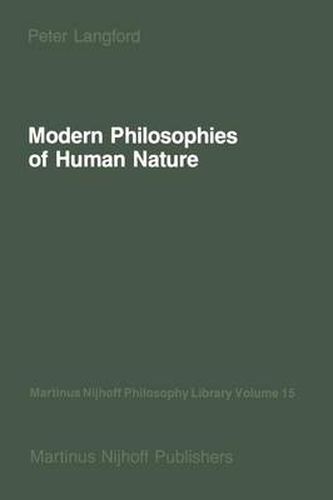Readings Newsletter
Become a Readings Member to make your shopping experience even easier.
Sign in or sign up for free!
You’re not far away from qualifying for FREE standard shipping within Australia
You’ve qualified for FREE standard shipping within Australia
The cart is loading…






This title is printed to order. This book may have been self-published. If so, we cannot guarantee the quality of the content. In the main most books will have gone through the editing process however some may not. We therefore suggest that you be aware of this before ordering this book. If in doubt check either the author or publisher’s details as we are unable to accept any returns unless they are faulty. Please contact us if you have any questions.
General Argument My aim is to survey some of the most influential philosophical writers on human nature from the time that Augustine codified Christian belief to the present. During this period philosophical opinions about human nature underwent a transformation from the God-centered views of Augustine and the scholastics to the human-centered ideas of Nietzsche, Freud and Sartre. While one aim has simply been to provide a handy survey, I do have three polemical purposes. One is to oppose the notion that the modernism of more recent writers was produced by methodological innovations. According to both Freud and Sartre, as well as other key figures like Lacan and Heidegger, their views were the product of new methods of investigating human nature, namely those of psychoanalysis and the phenomenological reduction. Psych,oanalysis claimed to use the interpretation of both dreams and the relationship between analyst and patient to penetrate the unconscious. Phenomenology has claimed that trained philosophers are able to obtain a privilege;d view of consciousness by a special act of thought called the phenomenological reduction which enables them to view consciousness without preconceptions. On many issues my sympathies are with Nietzsche rather than with Freud or phenomenology. This is also the case regarding methodology. Nietzsche saw quite clearly that the possibility of popularising the views he himself held came from the decline of ChristianitY. My rejection of exclusive reliance upon the methodologies of psychoanalysis and phenomenology is based on two lines of argument.
$9.00 standard shipping within Australia
FREE standard shipping within Australia for orders over $100.00
Express & International shipping calculated at checkout
This title is printed to order. This book may have been self-published. If so, we cannot guarantee the quality of the content. In the main most books will have gone through the editing process however some may not. We therefore suggest that you be aware of this before ordering this book. If in doubt check either the author or publisher’s details as we are unable to accept any returns unless they are faulty. Please contact us if you have any questions.
General Argument My aim is to survey some of the most influential philosophical writers on human nature from the time that Augustine codified Christian belief to the present. During this period philosophical opinions about human nature underwent a transformation from the God-centered views of Augustine and the scholastics to the human-centered ideas of Nietzsche, Freud and Sartre. While one aim has simply been to provide a handy survey, I do have three polemical purposes. One is to oppose the notion that the modernism of more recent writers was produced by methodological innovations. According to both Freud and Sartre, as well as other key figures like Lacan and Heidegger, their views were the product of new methods of investigating human nature, namely those of psychoanalysis and the phenomenological reduction. Psych,oanalysis claimed to use the interpretation of both dreams and the relationship between analyst and patient to penetrate the unconscious. Phenomenology has claimed that trained philosophers are able to obtain a privilege;d view of consciousness by a special act of thought called the phenomenological reduction which enables them to view consciousness without preconceptions. On many issues my sympathies are with Nietzsche rather than with Freud or phenomenology. This is also the case regarding methodology. Nietzsche saw quite clearly that the possibility of popularising the views he himself held came from the decline of ChristianitY. My rejection of exclusive reliance upon the methodologies of psychoanalysis and phenomenology is based on two lines of argument.